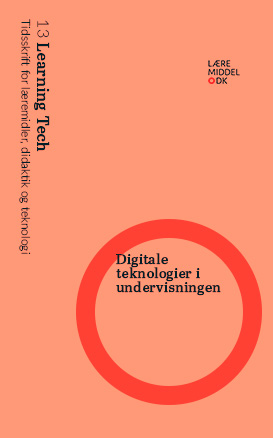I med- og modspil
– lærerperspektiver på samspillet mellem digitale teknologier og fagligt indhold i projektorienteret undervisning
DOI:
https://doi.org/10.7146/lt.v8i13.132972Abstract
This article empirically examines how teachers understand and deal with the content complexity found in problem-oriented teaching, and the role of functional digital learning tech in this context. The analyses indicate that even in highly framed problem-oriented teaching, the content focus develops, shifts and changes over the phases. Authentic problems are difficult to contain by the school's subjects and disciplines, and other types of knowledge than traditional scholastic ones become relevant. It is a strength of the problem-oriented design - but it also complicates the teacher's task of qualifying students' work and supporting a systematic knowledge development. At the same time, the teachers' use of technology is important for the ways in which the content of the teaching changes, just as the unpredictability of the content can place changing and unexpected demands on the functions and design of the learning tech.
References
Albrechtsen, T. R. S. & Qvortrup, A. (2017). Undersøgelsesbaseret undervisning. Et review af nyere forskningslitteratur fra et almendidaktisk perspektiv. (Forundersøgelse i projekt Kvalitet i dansk og matematik, delrapport 1). http://laeremiddel.dk/viden-og-vaerktoejer/rapporter/undersoegelsesbaseret-undervisning/
Belland, B. R., Glazewski, K. D. & Richardson, J. C. (2008). A scaffolding framework to support the construction of evidence-based arguments among middle school students. Educational Technology Research and Development, 56(4), 401-422.
Bundsgaard, J., Georgsen, M., Graf, S. T., Hansen, T. I. & Skott, C. K. (Red.). (2018a). Innovativ undervisning med IT. Forskning i tre demonstrationsskoleforsøg II. Aarhus Universitetsforlag.
Bundsgaard, J., Georgsen, M., Graf, S. T., Hansen, T. I. & Skott, C. K. (Red.). (2018b). Skoleudvikling med IT. Forskning i tre demonstrationsskoleforsøg 1. Aarhus Universitetsforlag.
Børne- og undervisningsministeriet. (2021). Problembaseret undervisning – virkelighedsnær og anvendelsesorienteret. emu.dk – Danmarks Læringsportal.
ChanLin, L.-J. (2008). Technology integration applied to project‐based learning in science. Innovations in Education and Teaching International, 45(1), 55-65. https://doi.org/10.1080/14703290701757450
Condliffe, B., Visher, M. G., Bangser, M. R., Drohojowska, S., & Saco, L. (2017). Project-Based Learning: A Literature Review. MDRC. https://pdfs.semanticscholar.org/1993/4293e1031b2511876ca04fbe5164bf3170d2.pdf
Dansk faghæfte. (2020). Dansk faghæfte 2020. Børne- og undervisningsministeriet. https://emu.dk/sites/default/files/2020-06/GSK_Dansk_Fagh%C3%A6fte_2020.pdf
Darling-Hammond, L. & Barron, B. (2010). Prospects and challenges for inquiry-based approaches to learning. I H. Dumont, D. Instance, & F. Benavides (Red.), The Nature of Learning. Using Research to Inspire Practice. OECD Publishing. http://www.keepeek.com/Digital-Asset-Management/oecd/education/the-nature-of-learning_9789264086487-en#page215. https://doi.org/10.1787/9789264086487-11-en
Elf, N. F. & Paulsen, M. (2017). Brug af it i gymnasiet – Muligheder og umuligheder. Gymnasiepædagogik, 434-457.
Flyvbjerg, B. (2015). Fem misforståelser om casemetoden. I: S. Brinkmann & L. Tanggaard (red.), Kvalitative metoder: En grundbog (2. udg.). Hans Reitzel.
Folkeskoleloven. (2021, LBK nr 1887 af 01/10/2021). Bekendtgørelse af lov om folkeskolen. Børne- og undervisningsministeriet. https://www.retsinformation.dk/eli/lta/2021/1887
Furtak, E. M., Seidel, T., Iverson, H. & Briggs, D. C. (2012). Experimental and quasi-experimental studies of inquiry-based science teaching: A meta-analysis. Review of educational research, 82(3), 300-329. https://doi.org/10.3102/0034654312457206
Gissel, S. T., Carlsen, D., Buch, B. & Skov, L. I. (2021). Læremidler og læremiddelbrug i L1 i Danmark: Læreres ibrugtagning, didaktisering og redidaktisering af didaktiske, semantiske og funktionelle læremidler i danskundervisningen. Learning Tech, 9, 80-119. https://doi.org/10.7146/lt.v6i9.124762
Graf, S. T. & Mikkelsen, S. S. (red.). (2021). Digital projektdidaktik. Aarhus Universitetsforlag.
Grossman, P., Dean, C. G. P., Kavanagh, S. S. & Herrmann, Z. (2019). Preparing teachers for project-based teaching. Phi Delta Kappan, 100(7), 43-48.
Grossman, P. (Red.). (2021). Teaching core practices in teacher education. Harvard Education Press.
Hansen, T. I., Elf, N. F., Misfeldt, M., Gissel, S. T., & Lindhardt, B. K. (2020). Kvalitet i dansk og matematik: Et lodtrækningsforsøg med fokus på undersøgelsesorienteret dansk- og matematikundervisning: Slutrapport. KiDM. http://laeremiddel.dk/wp-content/uploads/2020/01/Slutrapport-Kvalitet-i-dansk-og-matematik.pdf
Hansen, T. I. (2012). Indhold og genstand. I T. Illum Hansen, S. T. Graf & J. J. Hansen (Red.), Læremidler i didaktikken: Didaktikken i læremidler. Klim.
Hansen, T. I. (2015). Dansk. Klim.
Hansen, T. I. (2020). Indhold. I P. Brodersen (Red.), Didaktisk opslagsbog (1. udgave). Hans Reitzel.
Harmer, N. & Alison, S. (2014). The benefits and challenges of project-based learning. A review of the literature (Nr. 6; PedRIO Papers). Pedagogic Research Institute and Observatory (PedRIO), Plymouth University.
Kirschner, P. A., Sweller, J. & Clark, R. E. (2006). Why minimal guidance during instruction does not work: An analysis of the failure of constructivist, discovery, problem-based, experiential, and inquiry-based teaching. Educational psychologist, 41(2), 75-86. https://doi.org/10.1207/s15326985ep4102_1
Klafki, W. (1983). Kategorial dannelse og kritisk-konstruktiv pædagogik: Udvalgte artikler. Nyt Nordisk Forlag.
Nielsen, F. V. (2011). Noter om didaktikkens indholdsbegreb. I K. K. B. Dahl, J. Læssøe, & V. Simovska (Red.), Essays om dannelse, didaktik og handlekompetence: Inspireret af Karsten Schnack. Danmarks Pædagogiske Universitetsskole, Aarhus Universitet.
Nielsen, V. O. (2001). Projektarbejdets grundspørgsmål: Et bidrag til afklaring. Kroghs Forlag.
Matematik faghæfte. (2019). Matematik faghæfte 2019. Børne- og undervisningsministeriet. https://emu.dk/sites/default/files/2020-09/GSK_Fagh%C3%A6fte_Matematik.pdf
Ravitz, J. & Blazevski, J. (2014). Assessing the role of online technologies in project-based learning. Interdisciplinary Journal of Problem-Based Learning, 8(1), 64-79. https://doi.org/10.7771/1541-5015.1410
Scanlon, E., Anastopoulou, S., Kerawalla, L. & Mulholland, P. (2011). How technology resources can be used to represent personal inquiry and support students’ understanding of it across contexts. Journal of Computer Assisted Learning, 27(6), 516-529. https://doi.org/10.1111/j.1365-2729.2011.00414.x
Schwartz-Shea, P. & Yanow, D. (2013). Interpretive research design: Concepts and processes. Routledge. https://doi.org/10.4324/9780203854907
Slot, M. F. (2021). Teknologiforståelse i elevers digitale projektarbejde. I S. T. Graf & S. S. Mikkelsen (Red.), Digital projektdidaktik. Aarhus Universitetsforlag.
Wood, D. F. (2008). Problem based learning. BMJ, 336(7651), 971-971. https://doi.org/10.1136/bmj.39546.716053.80
Yin, R. K. (2018). Case study research and applications: Design and methods. Sage Publications.
Ünal, E. (2019). Web 2.0 Technologies Supporting Problem-Based Learning: A Systematic Literature Review. Journal of Problem Based Learning in Higher Education, 7(1), 25-50. https://doi.org/10.5278/ojs.jpblhe.v7i1.2845
Downloads
Published
How to Cite
Issue
Section
License
Forfatterne og Læremiddel.dk.
Må ikke bruges kommercielt.


